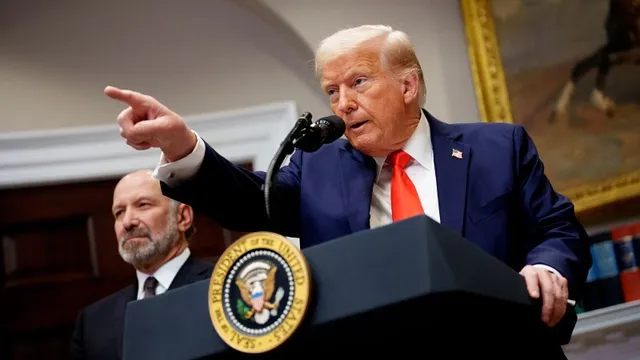
Trump claims total obliteration of Iran's nuclear program
2025-06-26 15:35- Trump emphasized that Iran's nuclear capabilities have faced significant setbacks due to military action.
- Despite claims from the U.S., Iranian officials maintain that their nuclear facilities are not obliterated.
- The assertion of total destruction indicates U.S. confidence in military effectiveness but highlights ongoing regional tensions.
Express your sentiment!
Insights
During a NATO summit in the Netherlands, President Donald Trump asserted that Iran's nuclear program had been completely obliterated following U.S. airstrikes. He dismissed doubts expressed by an early Pentagon report, which suggested that U.S.-Israeli strikes may have only delayed Iran's nuclear ambitions by a few months. Trump expressed confidence that Iran would not be building nuclear weapons in the foreseeable future. The Iranian government, however, claimed that their nuclear facilities remained intact and that the U.S. strikes had failed to achieve their intended goals. Trump also hinted at Israeli intelligence operatives being on the ground in Iran to assess the damage done. This raises concerns regarding the sharing of sensitive information and the potential risk to those operatives. The ongoing conflict between Iran and Israel contributes to an increasingly volatile geopolitical landscape, and with economic sanctions exacerbating Iran's existing economic troubles, the future of their nuclear ambitions is uncertain. As tensions remain high, negotiations and diplomatic engagement could become necessary to ensure regional stability.
Contexts
The Iran-Israel conflict has deep historical roots, shaped significantly by geopolitical dynamics, regional rivalry, and ideological differences. The enmity dates back to the establishment of Israel in 1948 and the subsequent Arab-Israeli conflicts, which Iran initially opposed given its support for Arab nationalism. However, the relationship took a drastic turn following the 1979 Islamic Revolution in Iran, which transformed the country into a theocratic regime opposed to Western influence and supportive of Palestinian rights. This ideological shift positioned Iran as a staunch adversary of Israel, condemning its actions in the occupied territories and advocating for resistance groups like Hezbollah and Hamas, which oppose Israeli policies through armed struggle and political activism. Throughout the decades, this rivalry has intensified due to several key events, including the Iran-Iraq War (1980-1988), during which Israel provided support to Iraq, and the Lebanese Civil War, where Iran's backing of Hezbollah directly opposed Israeli military operations. The conflict has occasionally escalated into military confrontations, most notably during the 2006 Lebanon War, when Hezbollah's attacks on Israeli positions prompted a robust Israeli response. This military activity highlighted not only the tensions between these two nations but also the broader regional implications, as various actors, including the United States and other global powers, navigated their interests amid this highly volatile situation. In the 21st century, the conflict has evolved further, marked by Iran’s nuclear ambitions and Israel’s apprehensions about a nuclear-armed Iran. The Joint Comprehensive Plan of Action (JCPOA) brokered in 2015 aimed to limit Iran's nuclear program in exchange for lifting economic sanctions. However, the US withdrawal from the agreement in 2018 and the subsequent re-imposition of sanctions have exacerbated tensions, leading to an increase in hostile rhetoric and a series of incidents attributed to both sides. Israel has engaged in a strategy of preemptive strikes against Iranian assets in Syria, claiming that these actions are necessary to counter Iran's military entrenchment near its borders and its support for hostile non-state actors. Meanwhile, Iran continues to assert its right to enrich uranium and expand its missile capabilities, further complicating the already intricate military and diplomatic landscape. Recent years have seen a shift as some Arab nations engage in normalization agreements with Israel, specifically the Abraham Accords in 2020, which have altered the strategic calculus in the region and isolated Iran diplomatically. In response, Iran has sought to strengthen its alliances with non-state actors and other hostile nations to counteract perceived threats from Israel and its new allies. As regional dynamics continue to evolve, the Iran-Israel conflict remains a focal point of Middle Eastern affairs, influencing geopolitical strategies while leaving a lasting impact on the security and stability of the region as both sides navigate their adversarial relationship amidst changing global attitudes and alliances.